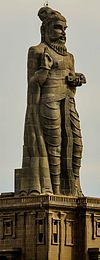Narayana Purushothama Mallaya
Narayana Purushothama Mallaya | |
|---|---|
| Born | 7 May 1929 |
| Occupation | Writer, literary activist |
| Parent(s) | N. M. Saraswathi Bhai |
| Awards | Padma Shri Sahitya Academy Award Konkani Pitamaha |
Narayana Purushothama Mallaya is an Indian author, known for his activism for Konkani language and literature.[1][2] A recipient of Sahitya Academy Award,[1][3] he was honoured by the Government of India in 2015 with Padma Shri, the fourth highest Indian civilian award.[4][5]
Biography[edit | edit source]
Narayana Purushothama Mallaya was born on 7 May 1929 in Mattancherry, a coastal town in Kochi, in the South Indian state of Kerala to N. M. Saraswathi Bhai, reportedly the first woman teacher in the state.[6] He did his early education at T. D. School, Mattancherry and the Government Commercial Institute, Ernakulam.[6] He started his career as a teacher by founding Ramakrishna Technical Institute in 1958, a commerce institute recognized by the state government.[6]
Mallaya is reported to have initiated the movement against the 1951 census report classifying Konkani as a dialect of Marathi and was successful in getting a language status for Konkani by the time the next census report was published in 1961.[2] In 1966, he initiated a movement for getting national language status for Konkani by appealing to Indira Gandhi, then Prime Minister of India and the efforts were successful in 1992 when the language was included in the 8th Schedule.[6] His contributions are also reported in the establishment of Konkani Prachar Sabha and a chair for Konkani language studies at Mahatma Gandhi University, Kottayam.[2]
Mallaya has authored 21 books[2] including Vedanta Bhushan Guruji Pandit Narayana Anantha Sarma Sastri Satakam,[7] a Konkani poem of 100 verses with English translation[8] and a translation of Tamil epic, the Tirukkural, composed of 1330 couplets in 133 chapters, into Konkani language.[9][10] He has translated Jnanappana and several other notable works of Vallathol and Rabindra Nath Tagore besides authoring biographies of N. M. Saraswati Bhai, Suniti Kumar Chatterji and Dr. T. M. A. Pai in verses.[9] Govinda Pai Satakam[11] and Calcutta Nagari Varnana[12] are two of his other notable works.[9]
Mallaya has received the Sahitya Academy Award for Konkani literature[1][3] and is a recipient of the title, Konkani Pitamaha from the Konkani Bhasha Prachar Sabha in 2005,[2] The Government of India included him in the Republic Day honours list, in 2015, for the civilian award of Padma Shri.[4]
See also[edit | edit source]
References[edit | edit source]
- ↑ 1.0 1.1 1.2 "The Indian Express". 21 March 2013. Retrieved 24 February 2015.
- ↑ 2.0 2.1 2.2 2.3 2.4 "GSB Konkani". GSB Konkani. 7 June 2005. Retrieved 24 February 2015.
- ↑ 3.0 3.1 "Daiji World". Daiji World. 21 March 2013. Retrieved 24 February 2015.
- ↑ 4.0 4.1 "Padma Awards". Padma Awards. 2015. Archived from the original on 26 January 2015. Retrieved 16 February 2015.
- ↑ "Times Content". Times Group. 27 January 2015. Retrieved 24 February 2015.
- ↑ 6.0 6.1 6.2 6.3 "The Hindu". 13 August 2009. Retrieved 24 February 2015.
- ↑ Narayana Purushothama Mallaya (2011). Vedanta Bhushan Guruji Pandit Narayana Anantha Sarma Sastri Satakam. Price Dekho.
- ↑ "E Bay". E Bay. 2015. Retrieved 24 February 2015.
- ↑ 9.0 9.1 9.2 "Tirukkural". The Hindu. 24 June 2002. Archived from the original on 24 February 2015. Retrieved 24 February 2015.
- ↑ "The Times of India". 15 June 2002. Retrieved 24 February 2015.
- ↑ Manohararāya Saradesāya (2000). [A History of Konkani Literature: From 1500 to 1992 A History of Konkani Literature: From 1500 to 1992]. Sahitya Akademi. pp. 307 of 317 pages. ISBN 9788172016647.
{{cite book}}: Check|url=value (help) - ↑ "Calcutta Nagari Varnana". DocStoc. 2015. Retrieved 24 February 2015.
Further reading[edit | edit source]
- Narayana Purushothama Mallaya (2011). Vedanta Bhushan Guruji Pandit Narayana Anantha Sarma Sastri Satakam. Price Dekho.
External links[edit | edit source]
- "Times Content Image Gallery". Times Group. 27 January 2015. Retrieved 24 February 2015.
- Recipients of the Padma Shri in literature & education
- 1929 births
- Living people
- Indian male poets
- Writers from Kochi
- Konkani-language poets
- Recipients of the Sahitya Akademi Award in Konkani
- 20th-century Indian poets
- Poets from Kerala
- Tamil–Konkani translators
- Translators of the Tirukkural into Konkani
- 20th-century Indian male writers
- People from Mattancherry
- Tirukkural translators
